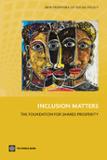World Bank – Inclusion Matters : The Foundation For Shared Prosperity
No comments yet Today, the world is at a conjuncture where issues of exclusion and inclusion are assuming new significance for both developed and developing countries. The imperative for social inclusion has blurred the distinction between these two stylized poles of development. Countries that used to be referred to as developed are grappling with issues of exclusion and inclusion perhaps more intensely today than they did a decade ago. And countries previously called developing are grappling with both old issues and new forms of exclusion thrown up by growth. Nonlinear demographic transitions, global economic volatility, shifts in the international balance of power, and local political movements have had a large part to play in these shifting sands. These changes make social inclusion more urgent than it was even a decade ago. This report tries to put boundaries around the abstraction that is “social inclusion.” Placing the discussion of social inclusion within such global transitions and transformations, the report argues that social inclusion is an evolving agenda. It offers two easy-to-use definitions and a framework to assist practitioners in asking, outlining, and developing some of the right questions that can help advance the agenda of inclusion in different contexts.
Today, the world is at a conjuncture where issues of exclusion and inclusion are assuming new significance for both developed and developing countries. The imperative for social inclusion has blurred the distinction between these two stylized poles of development. Countries that used to be referred to as developed are grappling with issues of exclusion and inclusion perhaps more intensely today than they did a decade ago. And countries previously called developing are grappling with both old issues and new forms of exclusion thrown up by growth. Nonlinear demographic transitions, global economic volatility, shifts in the international balance of power, and local political movements have had a large part to play in these shifting sands. These changes make social inclusion more urgent than it was even a decade ago. This report tries to put boundaries around the abstraction that is “social inclusion.” Placing the discussion of social inclusion within such global transitions and transformations, the report argues that social inclusion is an evolving agenda. It offers two easy-to-use definitions and a framework to assist practitioners in asking, outlining, and developing some of the right questions that can help advance the agenda of inclusion in different contexts.
This report builds on previous analytical work, especially by the World Bank, on themes that touch upon social inclusion, including multidimensional poverty, inequality, equity, social cohesion, and empowerment. There are seven main messages in this report: (1) excluded groups exist in all countries; (2) excluded groups are consistently denied opportunities; (3) intense global transitions are leading to social transformations that create new opportunities for inclusion as well as exacerbating existing forms of exclusion; (4) people take part in society through markets, services, and spaces; (5) social and economic transformations affect the attitudes and perceptions of people. As people act on the basis of how they feel, it is important to pay attention to their attitudes and perceptions; (6) exclusion is not immutable. Abundant evidence demonstrates that social inclusion can be planned and achieved; and (7) moving ahead will require a broader and deeper knowledge of exclusion and its impacts as well as taking concerted action. The report is divided into three parts. Part one is framing the issues. Part two focuses on transitions, transformations, and perceptions. Part three is change is possible.
Full text: https://openknowledge.worldbank.org/
You May Also Like
Comments
Leave a Reply






